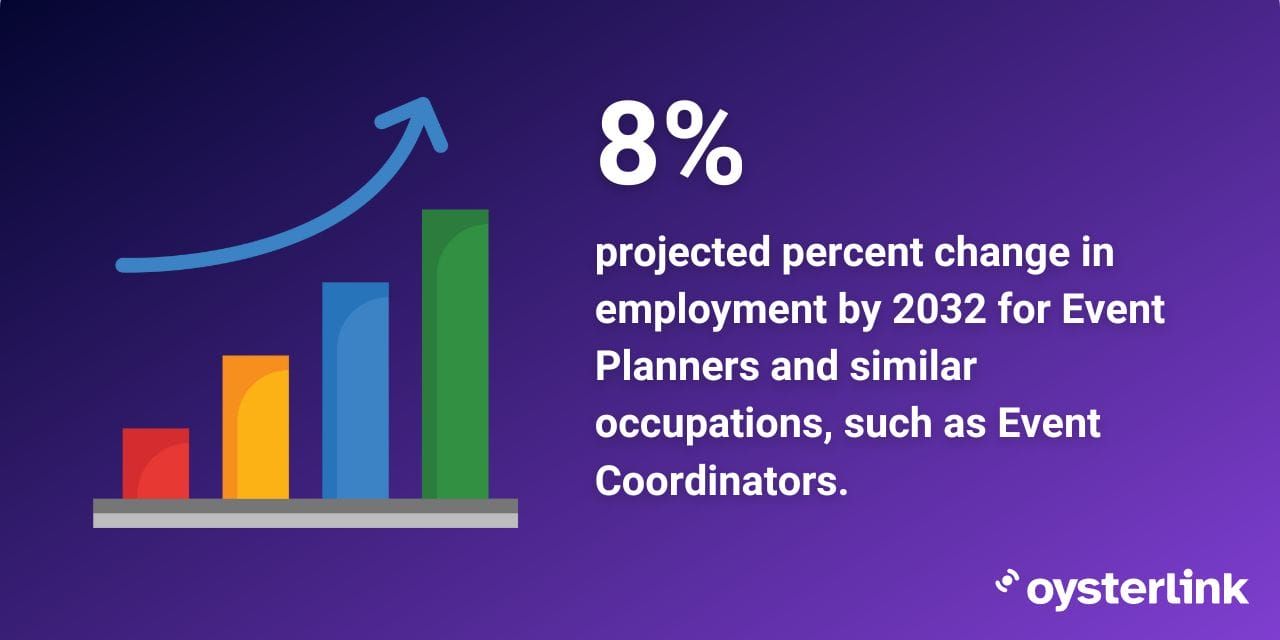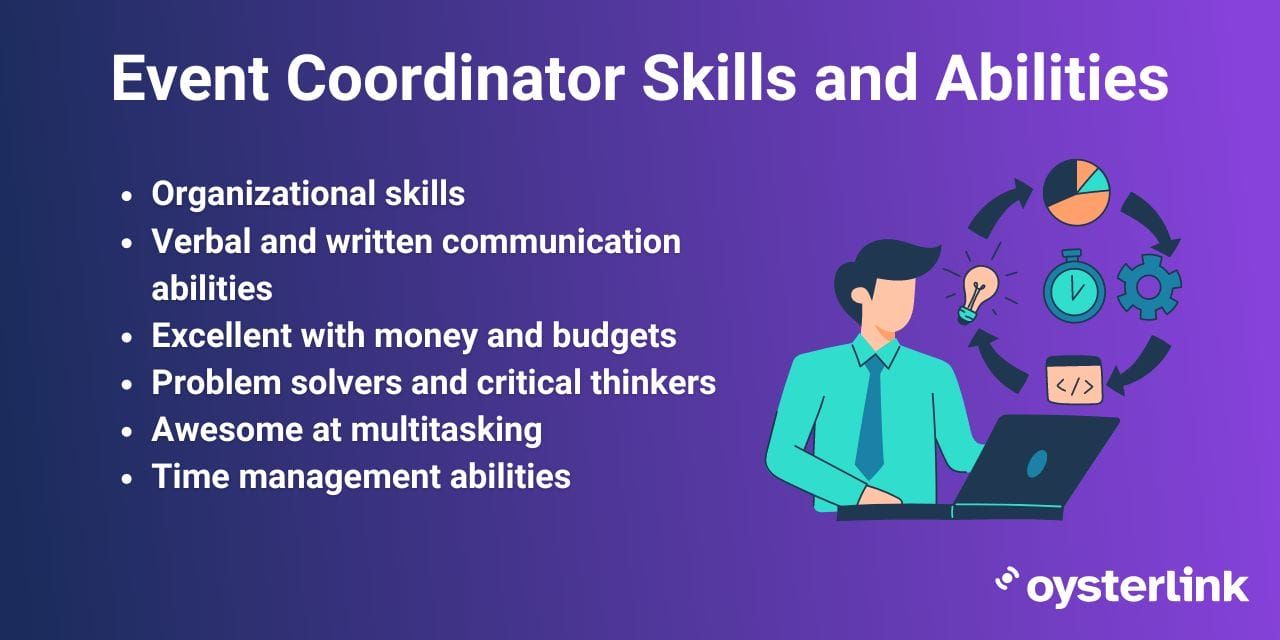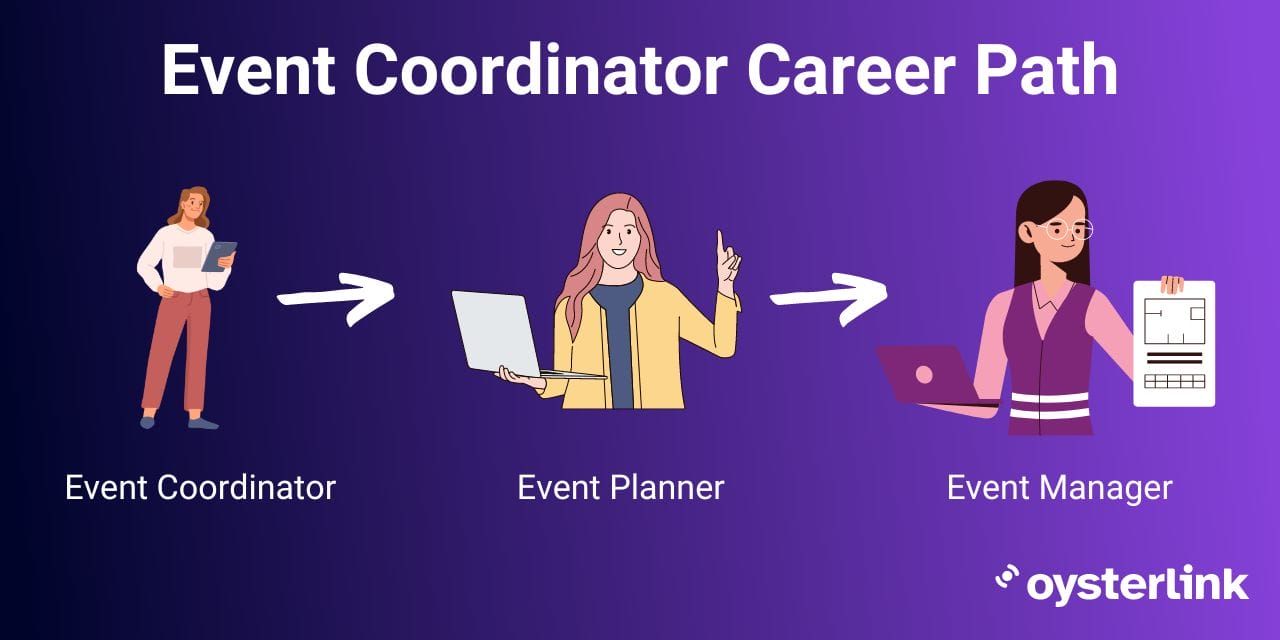Guide to an Event Coordinator Career
If you're organized and have great communication skills, you might have what it takes to be an Event Coordinator.
In this article, we'll go over everything you've ever wanted to know about this role, and hopefully help you land your first-ever Event Coordinator job.
What Is an Event Coordinator?
The Event Coordinator is the person who oversees the event and deals with issues that might occur during the event.
Some people think that working as an Event Planner and an Event Coordinator is the same thing, but it's not. There are major differences between these two roles.
Event Planners schedule and plan tasks on the days and weeks leading up to the event. Meanwhile, Event Coordinators are in charge of the event on the day itself. They often aren't closely involved in planning the event, as their main priority is running it.

If you're looking to get a job as an Event Coordinator, now's a great time to do it.
Event Planners and positions falling under the same umbrella (such as Event Coordinator) are expected to see an 8% increase in growth rate until 2032. For context, the average growth rate for all U.S. occupations is just 3%.
What Does an Event Coordinator Do?
The Event Coordinator does many things, but these are what anyone in this role does regularly.
- Meeting with clients: Event Coordinators regularly meet with clients to discuss the event and get a feel for what the client is looking for. They need to be great at taking notes and ensuring that the client's requirements are met.
- Drafting event proposals: Based on the client's requirements, the Event Coordinator will come up with an event proposal for the client to go over and approve or deny.
- Sticking to budgets: The Event Coordinator has to stick to strict budgets set out by the client.
- Booking catering, venue, decor and music: The Event Coordinator is typically the one who has to book the necessary staff to make the event a success.
- Scheduling: It's the Event Coordinator's job to schedule employees for the event and communicate with staff members during the event.
- Updating the client: The Event Coordinator needs to keep the client in the loop about changes or issues regarding their event.
- Running the event: On the day of the event, the Event Coordinator is the one who has to fix problems and delegate tasks.
You can see more about what the Event Coordinator does in our Event Coordinator job description.
Skills and Qualities of Event Coordinators
Event Coordinators need to be creative and have great organizational skills. Running an event isn't easy, and running a successful event is even more challenging.
To become an Event Coordinator, you have to be good with money (and math in general). That will come in handy when you need to manage funds and stay below the client's maximum allotted budget.
Event Coordinators are also great problem solvers who can quickly come up with solutions to issues on the spot. There really isn't a lot of time for thinking during the event and you'll often need to make snap decisions on the spot, so they need to be the right ones.

Finally, you need to be an excellent communicator or else you won't last a week as an Event Coordinator. From scheduling staff to discussing with clients and vendors, having excellent verbal communication is basically 101 for Event Coordinators.
How To Become an Event Coordinator
To become an Event Coordinator, you need to have the right education and experience.
Education and Experience Requirements for Event Coordinators
Most companies want an applicant with a degree in public relations, hospitality, marketing, communications or business.
Not many companies will hire someone with only a high school diploma. This is because the role requires managing budgets, projects, finances and human resources, all of which are something you study and learn in one of the degrees mentioned above.
Employers also often want a candidate who has several years of experience working as an Event Coordinator, Event Manager or Event Planner. Most employers want an applicant to have at least two years of previous working experience in a role of a similar capacity.
Event Coordinator Certifications and Courses
Having certifications isn't necessary to get a job as an Event Coordinator, but if you want to build up your resume, here are some relevant courses and certifications.
Event Coordinator Earning Potential
The average annual salary for Event Coordinators in the U.S. is $54,362. The actual salary employers offer you will often be based on factors like:
- Where you live
- The industry you work in
- How long you've been working as an Event Coordinator
- The company you work for
Not all Event Coordinators work full-time. Some work part-time and others freelance, taking on gigs as they see fit.
To view salaries in more detail, even broken down by states and cities, you can check out our detailed Event Coordinator salary guide.
Event Coordinator Career Progression
If you prove yourself as an Event Coordinator and you put on successful events, you can easily get promoted to either plan events as an Event Planner or manage events as an Event Manager and earn a higher salary.

It's not unheard of for Event Coordinators working in a hotel to make their way up the corporate ladder and eventually get promoted to the position of Hotel General Manager. Event Coordinators can also choose to start their own company once they have enough experience and connections in their industry.
What Is the Work Environment of an Event Coordinator Like?
The work environment is busy and always changing. Event Coordinators have to constantly travel to meet with clients and vendors and manage events, whether in nearby cities or farther destinations. You'll have to be able to adjust to constant traveling if you want to become an Event Coordinator.
Your work environment will be predominantly defined by the industry you work in. If you're a wedding coordinator, you'll obviously be around a lot of weddings, brides and grooms. If you're handling sports events, you'll probably meet some famous athletes (and get to watch games for free).
Pros and Cons of Working as an Event Coordinator
Like any other job, being an Event Coordinator comes with its positives and negatives.
Pros:
- Traveling: If you love to travel, you'll love working as an Event Coordinator.
- Networking: As an Event Coordinator, you'll get a chance to meet influential people from your industry. If you want to change careers or companies further down the line, these connections might help you.
- Career advancement: Event Coordinators can get promoted to Event Planners or Event Managers.
Cons:
- Time away from family and friends: With your busy schedule and the traveling you'll be doing means you need to be comfortable spending less time with family and friends on a regular basis.
- Pressure due to multiple responsibilities: Ultimately, how the event unfolds and whether it's seen as a success or a failure is down to you. You'll need to be okay with working under stress and having a lot of important responsibilities.
- Unconventional work hours: As an Event Coordinator, you'll need to work weekends and late nights often. Most events are held during the weekend (and a lot of them at night), so if you come into this job expecting a regular 9 to 5, you'll burn yourself out quickly.